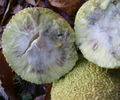Maclura
| Maclura | ||||||||||||
|---|---|---|---|---|---|---|---|---|---|---|---|---|

Sycamore tree ( Maclura tinctoria ) |
||||||||||||
| Systematics | ||||||||||||
|
||||||||||||
| Scientific name | ||||||||||||
| Maclura | ||||||||||||
| Nutt. |

The genus Maclura belongs to the mulberry family (Moraceae). The generic name Maclura honors the American geologist William Maclure (1763 to 1840).
description
Maclura species are woody plants. They grow as evergreen or deciduous, small to large trees , upright to climbing shrubs or lianas . They contain milk juice . All Maclura species have axillary, strong, straight and curved spines, at least as long as they are young. The alternate and spiral or two-line arranged leaves are simple and petiolate. The simple leaf blade is pinnate. The leaf margin is smooth. The two stipules are not grown together, this is where they differ from many other Moraceae.
Maclura species are dioeciously separated sexes ( diocesan ). The axillary inflorescences are heady , racemose or spiky . There are often many bracts at the base of the inflorescence. The two to four bracts per flower are fused with the calyx; each with two yellow glands. In the male flowers, the mostly four (rarely three or five) sepals are free or at most fused at their base and the mostly four (rarely three or five) stamens are straight. The female inflorescences are spherical. In the sessile female flowers, the fleshy sepals are free or fused and the short style ends in one or two unequal stigmas.
In the fleshy and more or less spherical fruit association , the bracts and the calyx are enlarged. The surface of the egg-shaped individual stone fruits looks like a shell and they are enveloped by the fleshy cups. The seeds are thin and fleshy.
The broad cotyledons ( cotyledons ) are twisted differently and equal or unequal.
Systematics and distribution
Maclura species are found in Africa, Asia, Australia, North America, the Pacific Islands, and South America. Five species thrive in China.
The genus Maclura was set up by Thomas Nuttall in 1818 in The genera of North American plants , Volume 2: p. 233. It belongs to the tribe Moreae within the family of the mulberry family (Moraceae). Synonyms for Maclura Nutt. are: Cardiogyne Bureau , Chlorophora Gaudich. , Cudrania Trécul , Fusticus Raf. , Ioxylon Raf. , × Macludrania André , Plecospermum Trécul , Vanieria Lour.
The genus Maclura is divided into five sections:
- Cardiogyne Section (Bureau) Corner
- Section Chlorophora (Gaudich.) Baill.
- Section Cudrania (Trécul) Corner : With two series Connatae Corner and Liberae Corner
- Maclura section
- Section Plecospermum (Trécul) CC Berg
There are about twelve species of Maclura :
- Maclura africana (Bureau) Corner : Home Africa.
- Maclura amboinensis flower : The home is China.
- Maclura andamanica (King ex JDHooker) CC Berg
- Maclura cochinchinensis (Loureiro) Corner (Syn .: Cudrania cochinchinensis (Lour.) Yakuro Kudo & Masam., Cudrania javanensis Trécul, Vanieria cochinchinensis Lour.): Home is China.
- Maclura excelsa Bureau: The home is West Africa.
- Maclura fruticosa (Roxburgh) Corner : The home is China.
- Milky orange tree or Osagedorn ( Maclura pomifera (Raf.) CK Schneid. , Syn .: Ioxylon pomiferum Raf.): The home is North America. For some authors the only species of the genre.
- Maclura pubescens (Trécul) ZKZhou & MGGilbert : The home is China.
- Maclura spinosa (Roxb. Ex Willd.) CC Berg
- Maclura thorelii Corner
-
Dyer's mulberry tree ( Maclura tinctoria (L.) D.Don ex Steud. ):
- Maclura tinctoria (L.) D. Don ex Steud. subsp. tinctoria (Syn .: Chlorophora tinctoria (L.) Gaudich., More tinctoria L.)
- Maclura tinctoria subsp. mora (Griseb.) Vazq.Avila (Syn .: Maclura mora Griseb.)
- Silkworm tree ( Maclura tricuspidata Carrière , Syn .: Cudrania tricuspidata (Carrière) Bureau ex Lavallée , Cudrania triloba Hance , Morus integrifolia H. Léveillé & Vaniot , Vanieria tricuspidata (Carrière) Hu , Vanieria triloba (Hance : China in Satake heights): Distribution from 500 to 2200 meters and Korea. Grown in Japan.
use
The fruits and wood are used by some species. Few species are used for dyeing. (see Artartikel milk orange tree , silkworm tree , dyer's mulberry tree )
photos
Milky orange tree ( Maclura pomifera ):
swell
- Zhengyi Wu, Zhe-Kun Zhou & Michael G. Gilbert: Moraceae in the Flora of China , Volume 5, p. 35: Maclura - Online.
- Abdul Ghafoor: Moraceae in the Flora of Pakistan : Maclura - Online.
- Maclura in Flora of Australia , Volume 3, 1989: Flora of Australia Online .
Individual evidence
- ^ A b Maclura in the Germplasm Resources Information Network (GRIN), USDA , ARS , National Genetic Resources Program. National Germplasm Resources Laboratory, Beltsville, Maryland.
- ↑ Maclura at the Flora of China .
- ^ Entry in the Flora of Zimbabwe .
Web links
- GJ Harden: Maclura New South Wales Flora Online .
- Richard P. Wunderlin: Moraceae in the Flora of North America , Volume 3: Maclura - Online. (There the view is held that the genus is monotypical, then the Asiatic species are in the genus Cudrania Trécul.)



